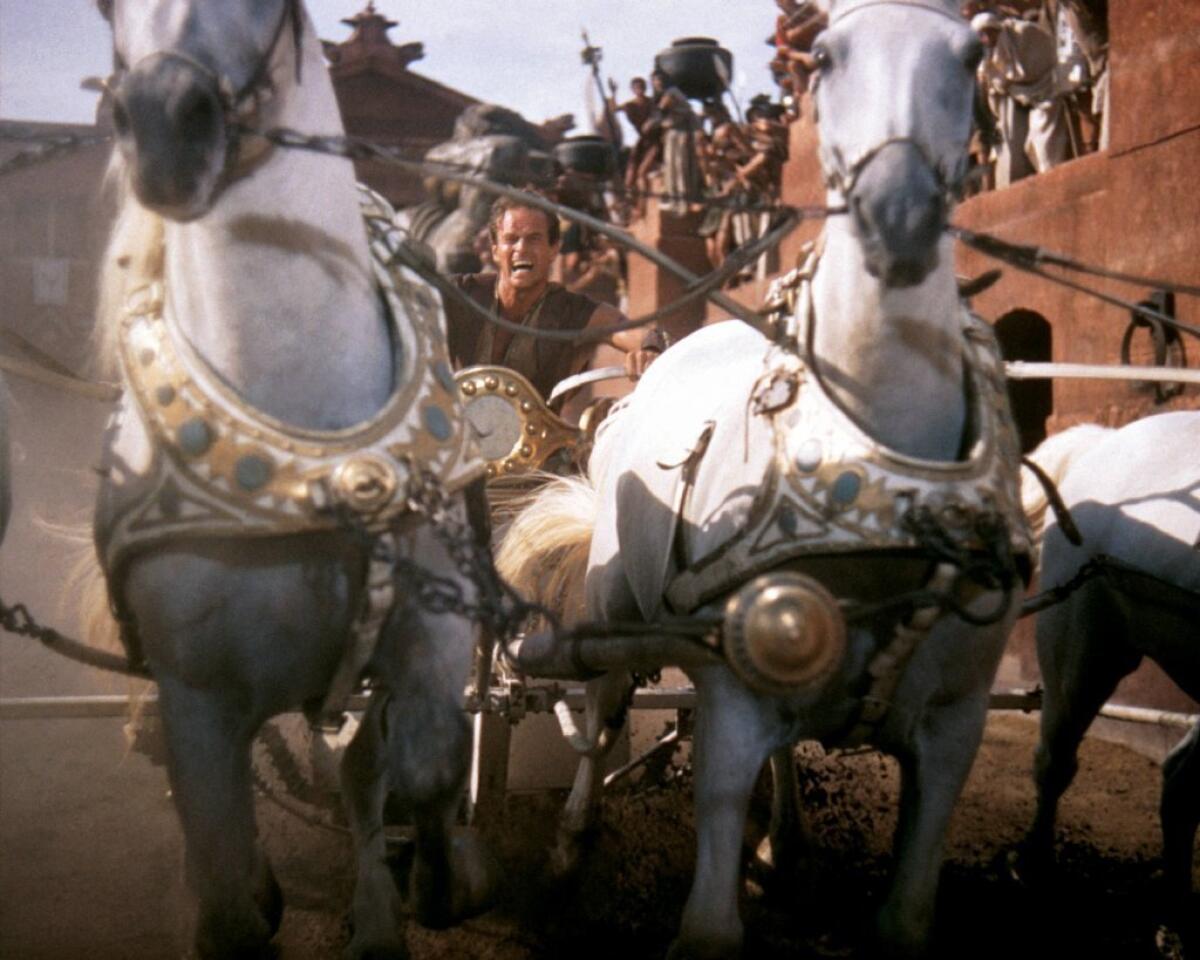Why the ‘Ben-Hur’ remake doesn’t give me that old-time religion
- Share via
There are a number of things missing from the new movie “Ben-Hur” — Quintus Arrius, functioning tripods, a discernible point — but nothing perhaps so notable as the words “A Tale of the Christ.”
That subtitle graced Lew Wallace’s 1880 novel and many of the film and television adaptations that have followed, signaling that the story of Judah Ben-Hur is also a stealth account of Jesus’ life and ministry. One Jewish man suffers gallantly but ultimately triumphs over slavery and injustice, and so, in a parallel chain of events, does another — only this time with crucifixion rather than chariot racing as the blood sport of choice, and with a message of divine forgiveness in lieu of mortal revenge.
It’s not entirely surprising that Timur Bekmambetov’s movie doesn’t include the subtitle (we should perhaps be grateful it isn’t called “Ben-Hur: Dawn of Justice”). But it feels curious nonetheless, insofar as Jesus actually has a fairly robust role this time around. Certainly he’s a much more emphatic presence here than he was in William Wyler’s Oscar-winning 1959 epic, which treated the Messiah as a strictly peripheral figure (played by an uncredited Claude Heater) who kept his face hidden even when he and Charlton Heston’s Judah have their fateful reunion on the road to Calvary.

Jack Huston, Morgan Freeman and Toby Kebbell star in “Ben-Hur.”
In the new “Ben-Hur,” by contrast, Jesus is played by a hunky Brazilian actor named Rodrigo Santoro, who receives third billing after his costars Jack Huston (Ben-Hur) and Toby Kebbell (Messala), as though completing some sort of above-the-title trinity. Santoro’s Jesus randomly pops up in scenes like a veritable Christ-in-the-box, at one point even doing some carpentry as he lectures Judah with a mouthful of New Testament platitudes. His declaration of “Father, forgive them, for they know not what they do” is so sweeping and powerful that (spoiler alert!) Messala not only survives in this retelling but winds up burying the hatchet with Judah, at which point the two ride their white horses into one of the most ludicrous feel-good endings in recent memory.
All of which may be a roundabout way of saying that this revisionist “Ben-Hur” bears the imprimatur of Mark Burnett and Roma Downey, the husband-and-wife executive producers who have lent their names and clout among evangelicals to the cause of numerous faith-based Hollywood entertainments. These include last year’s “Little Boy,” a morally repellent World War II-era fable in which the Almighty personally sees to the atomic bombings of Hiroshima and Nagasaki, and “Son of God” (2014), a serviceable but patchy Jesus drama culled from their History Channel miniseries “The Bible.”
Is this brand of evangelical pablum — full of piety and pageantry, but largely devoid of artistic merit or spiritual insight — what the Christian audience wants from its screen entertainment? To even pose that question is to fall into the trap that so many Hollywood decision makers have since the smash success of “The Passion of the Christ” 12 years ago: They effectively niche-ified “the Christian audience,” turning it into some sort of distant, monolithic entity that could, if properly courted, deliver an embarrassment of box-office riches. In the eyes of the industry, Christian moviegoers are little more than like-minded robots with a more God-fearing set of aesthetic taste buds than everyone else, and who routinely shun serious, provocative art but will embrace a movie that ends with a worship song and an altar call.
As a critic who himself happens to be a Christian (and vice versa), I’m happy to help lay waste to that particular misperception. I also don’t mind acknowledging that my admiration for Burnett and Downey’s personal beliefs far outpaces my respect for their decisions as creative storytellers. It’s plain enough to see the dramatic and aesthetic continuity between “Son of God” and the new “Ben-Hur,” and I don’t mean that as a compliment: Bekmambetov’s movie respects its spiritual underpinnings, but it’s utterly at a loss for how to dramatize them, or how to speak to its target audience in anything but the most leaden and prosaic of terms. The film may be trying to put Jesus in the spotlight where he belongs, but what it’s really doing is shoehorning him into the crevices of Ben-Hur’s story, reducing his words and deeds to a holier-than-thou sideshow.

That’s a trap that the 1959 “Ben-Hur” somehow miraculously avoided, never mind that it runs about twice as long as the new film and grants Jesus way less face time. There are plenty of reasons to snicker at Wyler’s movie today, and even more reasons to celebrate it: For all its dramatic stiffness and turgid stretches, it’s a film with the courage of its grandiose convictions. And it hails from a bygone era of superior Hollywood craftsmanship, when directors like Cecil B. DeMille (“The Ten Commandments,” “Samson and Delilah”), George Stevens (“The Greatest Story Ever Told”), Nicholas Ray (“King of Kings”) and Henry Koster (“The Robe,” “The Story of Ruth”) churned out stately, literate entertainments that didn’t feel the need to tiptoe around the skeptics in the audience.
Regardless of whether these filmmakers saw the Bible as sacred writ (and most of them didn’t), they instinctively understood its worth as drama, as literature, as its own cultural lingua franca. Here was the mother of all soap operas, an endlessly resonant and dramatically exploitable mega-narrative, “Game of Thrones” avant la lettre. By and large, Hollywood knew how to approach this material with the requisite respect and sensitivity, and with none of the timid Christian-niche pandering that weighs down so many present-day filmmakers venturing into faith-based waters, Bekmambetov being the latest unhappy example.
Hollywood knew how to approach this material with the requisite respect and sensitivity, and with none of the timid Christian-niche pandering.
Is there room in today’s cynical, agnostic, superhero-besotted movie landscape for a truly great religious drama? For a movie willing to risk scorn and absurdity in order to grapple with the agony and the ecstasy of following God, a movie that aspires to something more intellectually and morally provocative than this week’s version of “Risen” or “The Young Messiah”? Surely “The Passion of the Christ” counts, you may argue, though for my money Mel Gibson’s audience-flagellating epic is little more than a shrine to his own sadism. It’s still the most graceless “Christian” movie I’ve ever seen.
But there have been brighter spots since. I was more enamored than many critics (and Christians) of Darren Aronofsky’s thrillingly bold and unorthodox “Noah,” which derives its power almost entirely from the productive tension between the filmmaker’s personal skepticism and his determination to give the material its proper due. It was for similar reasons that I found myself among the minority who admired Ridley Scott’s widely derided “Exodus: Gods and Kings,” with its harsh, jaundiced view of the Creator and its vibrantly cinematic embrace of Old Testament spectacle.
As it happens, the finest Christian drama in recent memory — not a biblical epic, strictly speaking, but rather a speculative work set in biblical times — surfaced in a handful of American theaters just a few months ago. I’m referring to “Last Days in the Desert,” Rodrigo Garcia’s haunting, austere, fanciful and entirely gripping account of Jesus’ 40 days in the wilderness, starring Ewan McGregor in a superb dual-layer performance as the Son of God and his insinuatingly devilish counterpart. A searching, compassionate and deeply intelligent work, exquisitely filmed and shot through with a powerful sense of the sublime, it offers its own bracing new testament to what cinema can accomplish in this day and age — the rare tale of the Christ that truly and fully earns that designation.
Movie Trailers
ALSO
Review: The updated ‘Ben-Hur’ has little to offer besides chariot thrills
‘Rocky,’ ‘Ali’ and beyond: Boxing has a rich history in the movies
Tackling the iconic ‘Ben-Hur’ presents an epic-sized challenge
Review: Jonah Hill kills, but ‘War Dogs’ misses its target
Review: ‘Kubo and the Two Strings’ spins a wondrous stop-motion yarn
More to Read
Only good movies
Get the Indie Focus newsletter, Mark Olsen's weekly guide to the world of cinema.
You may occasionally receive promotional content from the Los Angeles Times.











